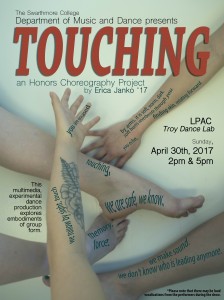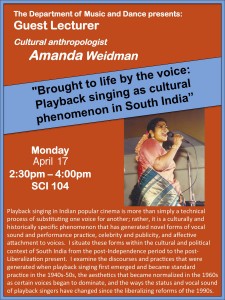Fall 2017
SWARTHMORE COLLEGE
produced by the Theatre Department
in collaboration with the Music and Dance Department
AUDITION ANNOUNCEMENT
**Casting 8 singing roles and 1 non-singing role**
AUDITIONS:
Monday, Sept 4, 7-10:30pm
Tuesday, Sept 5, 7-10:30pm
AUDITION LOCATION:
The Kuharksi Studio, rear entrance of The Matchbox
***********
ABOUT THE PRODUCTION/COURSE
In Fall 2017, Swarthmore’s Theatre Department will be working on a production of the Broadway hit The 25th Annual Putnam County Spelling Bee. The show will be presented as part of the Theatre Department Course “Production Ensemble” (THEA 22), which is designed to provide students the opportunity to work with professional theatre artists in the creation of a fully-designed and rendered production. Students cast in the show will have to enroll in THEA 22.
ABOUT …SPELLING BEE
Winner of the Tony and the Drama Desk Awards for Best Book, The 25th Annual Putnam County Spelling Bee has charmed audiences across the country with its effortless wit and humor.
An eclectic group of six mid-pubescents vie for the spelling championship of a lifetime. While candidly disclosing hilarious and touching stories from their home lives, they spell their way through a series of (potentially made-up) words, hoping never to hear the soul-crushing, pout-inducing, life un-affirming “ding” of the bell that signals a spelling mistake. Six spellers enter; one speller leaves! At least the losers get a juice box.
HERE’S WHAT YOU NEED TO KNOW ABOUT AUDITIONING
We’ll be auditioning actors for all roles, including the non-speaking role.
If you’re interested in auditioning for this production:
1) SIGN UP:
Please sign up for an audition slot by filling out the online sign-up form which can be found here: goo.gl/W7mdMc. Walk-up auditions are possible, but those who have signed-up will have first priority.
2) PREP FOR YOUR AUDITION:
For the audition, we’ll ask you to do two things: sing and to tell us a story.
• For the song: please prepare 32-bars of a song from a musical or a contemporary pop song. Please bring sheet music in the correct key, an accompanist will be provided. If you’d like to sing a capella, that’s okay, though an accompanied song is preferred. It is perfectly acceptable to sing music from SPELLING BEE, but please still bring a copy of the music. • For the story: Tell us a 1-2 minute story about yourself, something you find funny, sad, or moving. We’re using this opportunity to meet you and get to know you a little bit.
• If you’re auditioning for the non-singing role, you will be asked to ONLY tell us a story; you will not be required to sing.
• If you don’t know the show, take a listen to the soundtrack to get a sense of the show’s style, humor, and music.
3) CALLBACKS:
Select students will be invited to a Callback Session on either Wed, Sept 6 (7-10:30pm) or Thurs, Nov 7 (4-10pm).
4) NOTIFICATIONS:
Callbacks will be posted late on Tuesday, Sept 5th. Casting will be announced the morning of Friday, Sept 8th.
5) TAKE A LOOK AT THE PRODUCTION SCHEDULE:
• All cast performers are required to sign up for THEA 22 and be available for all rehearsals, which occur on:
Sundays 12-6pm
Tuesdays 7:30-10:30pm
Thursday 4:10-7:30pm
• You may be asked to schedule time with the production’s vocal coach outside of rehearsal times, though we will set this around your existing schedule.
• Cast members will also need to be available for all technical rehearsals:
Friday, Nov 3 – 6-10pm
Saturday, Nov 4 – 10am-10pm
Sunday, Nov 5 – 10am-10pm
Monday, Nov 6 – 6-10pm
Tuesday, Nov 7 – 6-10pm
Wednesday, Nov 8 – 6-10pm
Thursday, Nov 9 – 6-10pm
• Performances will be on:
Friday, Nov 10, 8pm
Saturday, Nov 11, 2 and 8pm
Sunday, Nov 12, 2pm
• After Nov 12th, your scheduled work for this class will be complete. There are no additional class meetings (though there will be one reflection paper due).
6) Got any questions? Email Professor Alex Torra, atorra1@swarthmore.edu
ROLES AVAILABLE
(Cast actors will play additional small roles not listed below)
STUDENT COMPETITORS
Olive Ostrovsky: Mezzo-Soprano. A young newcomer to competitive spelling. Her mother is in an ashram in India, and her father is working late, as usual, but he is trying to come sometime during the bee. She made friends with her dictionary at a very young age, helping her to make it to the competition.
William Morris Barfée: Tenor. A Putnam County Spelling Bee finalist last year, he was eliminated because of an allergic reaction to peanuts. His famous “Magic Foot” method of spelling has boosted him to spelling glory, even though he only has one working nostril and a touchy personality. He has an often-mispronounced last name: it is Bar-FAY, not BARF-ee (“there’s an accent aigu, he explains with some hostility). He develops a crush on Olive.
Logainne “Schwarzy” SchwartzandGrubenierre: Mezzo-Soprano. Logainne is the youngest and most politically aware speller, often making comments about current political figures, with two overbearing gay fathers pushing her to win at any cost. She is somewhat of a neat freak, speaks with a lisp, and knows she’ll return to the bee next year.
Marcy Park: Mezzo-Soprano. A recent transfer from Virginia, Marcy placed ninth in last year’s nationals. She speaks six languages, is a member of all-American hockey, a championship rugby player, plays Chopin and Mozart on multiple instruments, sleeps only three hours a night, and is getting very tired of always winning. She is a total over-achiever, and attends a Catholic school called “Our Lady of Intermittent Sorrows.” She is also not allowed to cry.
Leaf Coneybear: Tenor. A homeschooler and the second runner-up in his district. Leaf comes from a large family of former hippies and makes his own clothes. He spells words correctly while in a trance. In his song, “I’m Not That Smart”, he sings that his family thinks he is “not that smart,” but he insinuates that he is merely easily distracted.
Charlito “Chip” Tolentino: Tenor. A Boy Scout and champion of the Twenty-Fourth Annual Putnam County Spelling Bee, he returns to defend his title. Relatively social and athletic, as he plays little league, Chip expects things to come easily but he finds puberty hitting at an inopportune moment.
ADULTS
Rona Lisa Peretti: Mezzo-Soprano. The number-one realtor in Putnam County, a former Putnam County Spelling Bee Champion herself, and returning moderator. She is a sweet woman who loves children, but she can be very stern when it comes to dealing with Vice Principal Panch, who has feelings for her that she most likely does not return. Ms. Peretti herself won the Third Annual Putnam County Spelling Bee by spelling the word “syzygy”.
Vice Principal Douglas Panch: Non-singing Role. After five years’ absence from the Bee, Panch returns as judge. There was an “incident” at the Twentieth Annual Bee, but he claims to be in “a better place” now (or so we think), thanks to a high-fiber diet and Jungian analysis. He is infatuated with Rona Lisa Peretti, but she does not return his affections.
Mitch Mahoney: Tenor. The Official Comfort Counselor. An ex-convict, Mitch is performing his community service with the Bee, and hands out juice boxes to losing students



